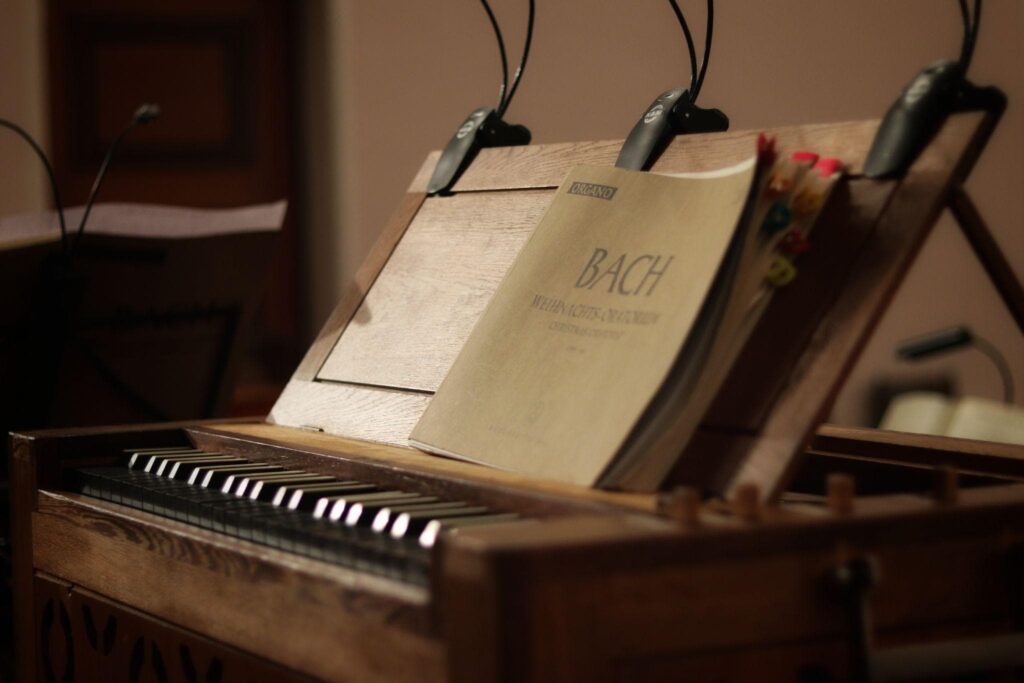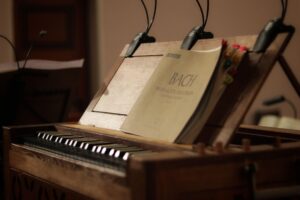Church Musicians: Bridging Faith and Artistry in Worship

For millennia, music has been a medicine for the mind and soul and one of the most beautiful expressions of humanity. Spirituality and music have made people’s lives better and more beautiful, regardless of background and social status. In the hallowed halls of worship, it found new meanings, and church musicians have used it as a conduit between humans and divinity. The most beautiful songs can elevate the worship experience and unite people by establishing a spiritual connection that transcends barriers.
The Spiritual Significance of Music in Worship
Church musicians have been around for centuries, and they play an equally important role today as they did in the distant past. Religious music, in general, has changed many times and evolved to meet better the needs and desires of those seeking a strong connection to divinity. Music has the advantage of being a universal language, equally powerful regardless of where you are born and no matter what language you speak. Not surprisingly, it has been a key part of religious practices worldwide.
Churchgoers and worshipers can tap into the immense potential of music as an instrument that resonates with their deepest feelings. Church musicians have the merit of conveying powerful messages through the lyrics, but also the feelings of reverence, joy and contemplation. It is also a highly effective medicine for the soul, so even when it evokes feelings of sorrow, it does it in a way that mends the heart. Church music evolved from the early Gospels to contemporary worship music. Here are the most common types of church music:
- Organists
- Choir Directors
- Pianists
- Worship Band Members
- Vocalists
Each religion has a distinct way of using music to bring congregants together and create a sense of unity in the halls of worship. Church musicians have the merit of creating an atmosphere where the sacred and profane coexist in perfect harmony. Each has a distinct role in a complex arrangement that delivers a heartfelt performance through music. Regardless of individual differences, melodies help worshipers experience a feeling of togetherness and communion.
Church Musicians are more than Performers
Reducing church musicians to the stature of regular performers would be a mistake because they accomplish significantly more. Just like regular artists, they use their native and honed skills to create true masterpieces that are pleasant to hear. Whether they play the piano, perform as an organist, vocalists or choir directors, they aspire to deliver the best musical performance possible. Experienced church musicians shine brightly and are a pleasure to listen to even outside the place of worship.
What makes church musicians special is that they also have a thorough understanding of the spiritual context. Every choice they make regarding the songs and hymns is aimed at complementing and enhancing the theme of their service. In many cases, the goal is to add to the sermon’s message and use music as a conduit for congregants. Instead of simply delivering the message plainly and straightforwardly, they encourage them to embark on a musical journey. The most significant role of church musicians:
- Spiritual Ambassadors Through Music
- Conveying Worship’s Emotions and Themes
- Enhancing the Worship Experience
- Encouraging Congregational Participation
- Facilitating Moments of Reflection and Prayer
Experienced church musicians have a broad selection of songs that can fit any narrative and also the ability to improvise. This is an important quality of their artistry, enabling them to turn a regular sermon into a memorable experience. Sometimes, the music is used to set the stage for worshipers, on other occasions, it acts as a link between the segments of the service. In any case, it captures the essence of the worship experience and immerses participants.
The Evolution of Church Musicians
Religious beliefs have not changed much over the centuries, so it is no surprise that church musicians followed a similar trajectory. However, they inevitably find themselves compelled to evolve while trying to maintain the delicate balance between tradition and innovation. The goal is the same, and in their quest to encourage congregational participation, a mix of classic and modern techniques is used. When done properly, most participants find themselves overwhelmed by emotions and join voices in a sense of unity.
Church musicians have always tried to create arrangements that are both appealing and accessible so that everyone can participate. Back in the day, traditional hymns and psalms were the mainstay of their artistry, but new forms of art have been immersed in recent years. Contemporary worship songs beautifully succeed at integrating electronic elements and modern instruments. They can enhance the quality of classic songs while producing new art that appeals to the younger generations.
Change is necessary even in areas where sacred traditions are essential and continue to shape generations of churchgoers. The most talented musicians can blend new and old songs that capture the essence of the past while embracing new trends. They succeed in creating a feeling of continuity while remaining relevant and serving the same higher purpose. Church musicians are committed to the service of fate; every artistic effort is channelled in this direction.
The beauty of church music is that it turns our regular moments into memorable ones while also having a long-lasting effect. There is tremendous effort and countless hours of practice involved, with a beautiful service being the culmination of thorough preparation and rehearsals. Worshipers will enjoy a fantastic Sunday morning in church, but those few delightful hours are the result of hard work. The best gospel bands and musicians have a dedicated fan base who listen to their great songs.
A Hidden Gem Worth Exploring
Religious people can be regularly exposed to the delightful melodies prepared and sung by church musicians. For the most authentic and immersive experience, the songs should be enjoyed in a place of worship on a beautiful Sunday morning. However, even those who haven’t had the chance to listen to this niche musical genre would be right to give it a chance. There’s a high likelihood of falling in love with the lyrics, vibes and feeling of communion this music delivers.
Check out the incredible contribution of church musicians in a concise table:
| Church Musicians | Faithful Expression | Artistic Excellence |
| Role | Spiritual Ambassadors | Conveying Emotions through Songs |
| Connecting Worshipers | ||
| Music Styles | Hymns | Classic Worship |
| Gospels | Contemporary Musical Genres | |
| Nurturing Faith Through Music | Scriptural Interpretation | Creativity and Storytelling |
| Reflection Through Music | Expressing Sacred Truths |
The best-case scenario is to discover a gem hidden in plain sight, and the worst that can happen is to check it off the list. This applies to everything in life, including new forms of entertainment never tried before. It’s not surprising that online casinos offer free 20 spins no deposit and other deals with no strings attached to new players. If they enjoy the experience, they can always return for more. Otherwise, they can focus on other forms of entertainment that are better suited to their needs.
Conclusion
Church musicians have made an incredible contribution to religion and continue inspiring worshipers. Their wonderful music creates an atmosphere that transcends the mundane and touches the divine for a brief moment in time. Churchgoers have the unique opportunity to walk a bridge between the profane and the divine in a bonding worship experience. Through music, anyone can feel this binding spiritual connection and catch a glimpse of the divine.






